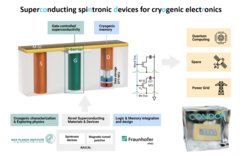Superconducting spintronic devices for cryogenic electronics - Project CONDOR
Supervisor: Prof. Dr. Stuart Parkin
Responsible Scientific Pillar Coordinator: Dr. Jae-Chun Jeon

The rapid growth of quantum computing technologies, i.e. superconducting and spin qubits, that operate at low temperatures (< 1 K) has triggered the demand for fast and reliable memory and logic devices to support such complex quantum processes. During the last few years, we have pioneered superconducting electronic devices including Josephson junctions (JJs), Josephson diodes (JDs) and spin-triplet devices [1-6] which use dissipationless currents. Recently, control of superconducting states in metallic superconductors via electric field gating has garnered much attention since the effect could lead to the development of a superconducting transistor – which can be a fundamental part for superconducting logic. The gate effect has been explained by the decay of high-energy electrons into phonons, which eventually suppresses the superconducting state in metallic superconducting nanowires. [7-11]. However, detailed physics, dynamics, and mechanisms are not clearly proven yet.
This project deals with exploring physics behind voltage-controlled superconductivity in metallic and high-Tc superconductors (with various dielectric materials for the gate effect) via highly sophisticated electrical transport measurements and devices. Our findings will be used as building blocks for superconducting logic and memory.The goal of the project is to bring memory and logic functions to the sub-Kelvin range using the gate effect in superconducting nanowires. This will break the bottleneck of current quantum computing technology in which the logic and data are transferred via long transmission lines in a dilution fridge (see picture). The project is in close collaboration with the Fraunhofer Institute for Photonic Microsystems, Dresden, where cryogenic magnetic random access memory (MRAM – both spin-orbit torque and spin-transfer torque will be considered) will be developed. We will actively exchange our knowledge and experiences in order to accelerate the development process (with regular on/off-line meetings). At the end of the project, together with experts in superconductivity, spintronics, electronic circuits, and quantum computing technologies, we aim to integrate gate-controlled superconductivity and cryogenic MRAM to develop a novel low-energy cryogenic non-volatile logic and memory with 300 mm wafer technology.
In this project, you will use a cutting-edge dilution fridge (Bluefors) with high-speed electronics to explore the physics. Furthermore, you will fabricate most sophisticated superconducting/spintronic devices using electron beam lithography and ion-beam etching techniques.
The project is designed for 3 years (01.2024 ~ 12.2026). We seek two PhD students (this project will be the main subject for the thesis) and two postdoctoral researchers who are creative, self-motivated, and who have strong time management skills and a spirit for teamwork. For postdoctoral researchers, scientists with a PhD degree in physics (superconductivity-related topics with strong publication record) and with experience in electrical transport measurement (including coding skills) and device fabrication will be given priority. The project will also allow exchange with the Fraunhofer institute for Photonic Microsystems where large scale (300 mm) wafer based quantum and spintronics technologies are available.
Literature:
[1] K.-R. Jeon et al., Nat. Nanotechnol. 18 (2023)
[2] J.-K. Kim et al., Nat. Commun. 15 (2024)
[3] K.-R. Jeon et al., Nat. Mater. 21 (2022)
[4] B. Pal et al., Nat. Phys. 18 (2022)
[5] H. Wu et al., Nature 604 (2022)
[6] K.-R. Jeon et al., Nat. Mater. 20 (2021)
[7] M. F. Ritter et al., Nat. Commun. 12 (2021)
[8] L. D. Alegria et al., Nat. Nanotechnol. 16, (2021)
[9] G. De Simoni et al., Nat. Nanotechnol. 13 (2018)
[10] M. F. Ritter et al., Nat. Electron. 5 (2022)
[11] L. Ruf et al., arXiv:2302.13734 (2023)
Contact:
For scientific questions about the research details, please contact Dr. Jae-Chun Jeon. For formal questions regarding the application, please contact Michael Strauch.
